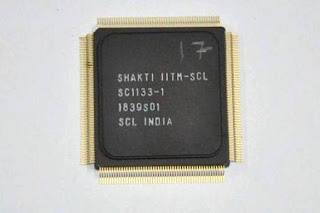
Shakti is a part of India's homegrown program to develop its
own processors, ranging from IoT to high-end servers, AI and ML processors.
Physical manufacturing of chips – slated for first quarter
of 2018 – could be the beginning off competition against chipmakers such as ARM
It piggybacks on the open source RISC-V (pronounce as risk)
instruction set architecture, an alternative to the existing closed and costly
designs.
it will be the first open source processor of its kind built
from scratch out of India.
3 TYPES
1. E class - Robotics controller
2. C class -Mobile processor
3. I class - Pc or laptop
Shakti mobile processor Compete qualcomm and mediatek
first shakti processor was designed on 180nm

The Shakti project is based on the RISC-V aur , RISC, stands
for reduced instruction set computer, is an architecture that uses fewer
computing cycles per instruction making it ideal to carry out a set of smaller
and general instructions
A C-class controller, an entry-level processor with use in
IoT, smart cards and security applications, will be the first in the Shakti
series out first quarter of 2018
The first chip of the Shakti series will be a C-class
controller chip, an entry-level processor, which would find use-cases in IoT,
smart cards, and security applications.
The RISC-V standard offers quality, flexibility and low
cost, setting it apart from proprietary ISAs.
The RISC-V Foundation, a
non-profit corporation, which wants to make the ‘Linux of microprocessor
architectures’, has been getting traction lately. Started in 2014, its
membership base has grown to over a hundred organisations, the foundation said
in an announcement earlier this week. Apart from the world’s leading tech
universities, its members include Google, Huawei, Micron, Microsemi, NVIDIA,
NXP, Qualcomm, Samsung, SiFive, among others.
Referring to a Berkley project where a team of seven
researchers taped out a chip equivalent to an ARM processor, PhD scholar Neel
Gala says, “There is nothing that is sacred and holy that we don’t know.”
Shakti has its talent locked in, clearly, but the big
imponderable in the chips business is time. Delays are common, even more in
academic efforts. So too with Shakti project.
He also points out that over the last few years, ARM has
shown interest in enabling custom SoCs at a low investment, through its
DesignStart program. (SOC is short for system on a chip, which is an integrated
circuit with multiple computing
components on a single substrate and is designed for specific applications.
They are relatively cheap and consume less power.)
While ARM dominates the smartphone market and Intel
dominates the server market, a dominant player has yet to emerge in the areas
of IoT and AI, areas where RISC-V could make inroads if an extensive ecosystem
is in place,
Used in rocket , robots and mobiles



No comments